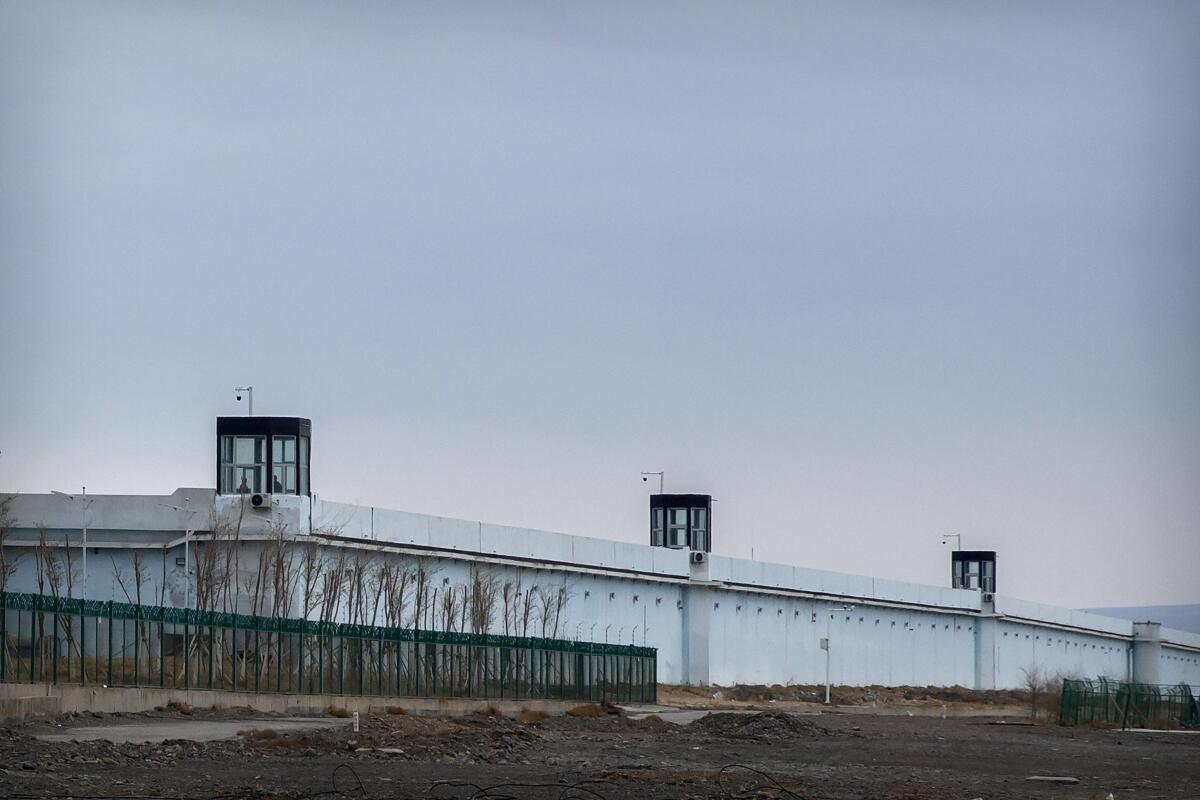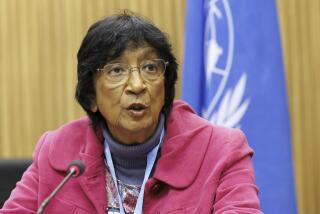U.N. cites possible crimes against humanity in China’s detention of Uyghurs in Xinjiang

GENEVA — China’s detention of Uyghurs and other mostly Muslim ethnic groups in the northwestern region of Xinjiang may constitute crimes against humanity, the United Nations human rights office said Wednesday in a long-awaited report that cited “serious” rights violations and patterns of torture in recent years.
The report calls for an urgent international response over allegations of torture and other rights violations stemming from Beijing’s campaign to root out terrorism.
U.N. human rights chief Michelle Bachelet, who traveled to Xinjiang in May, brushed aside China’s calls to withhold the report. Beijing has contended that the report is part of a Western campaign to smear China’s reputation.
The report has fanned a tug of war with the West for diplomatic influence over the rights of the region’s native Uyghurs and other predominantly Muslim ethnic groups.
The report, which Western diplomats and U.N. officials said had been all but ready for months, was published with just minutes to go in Bachelet’s four-year term. It was not expected
to break significant new ground; independent advocacy groups and journalists have been documenting concerns about human rights in Xinjiang for years.
But the report comes with the imprimatur of the United Nations and its member states. The run-up to its release fueled a debate over China’s influence at the world body and epitomized the on-and-off diplomatic chill between Beijing and the West over human rights and other issues.
The 48-page report says “serious human rights violations” were committed in Xinjiang between 2017 and 2019 under China’s policies to fight terrorism and extremism, which singled out Uyghurs and other predominantly Muslim communities.
The report says there were “patterns of torture” inside what Beijing called vocational centers, which were part of its reputed plan to boost economic development in the region, and it points to “credible” allegations of mistreatment, including cases of sexual violence.
The “arbitrary and discriminatory detention” of such groups in Xinjiang, through moves that stripped them of “fundamental rights ... may constitute international crimes, in particular crimes against humanity,” the report says.
The report is based on interviews with former detainees and others familiar with the conditions at eight detention centers in the region. Its authors suggest China was not always forthcoming with information, saying some requests for specific information “did not receive formal response.”
The rights office said it could not confirm estimates of how many people were detained in the Xinjiang camps, but added it was “reasonable to conclude that a pattern of large-scale arbitrary detention occurred” at least between 2017 and 2019.
According to information gathered in investigations by other rights monitors and journalists, the Chinese government’s mass detention campaign in Xinjiang swept an estimated million Uyghurs and members of other ethnic groups into a network of prisons and camps over the last five years.
Beijing has closed many of the camps, but hundreds of thousands continue to languish in prison on vague or secret charges.
Beyond the camps, the rights office also reviewed reports of sharp increases in arrests and lengthy prison sentences in the region, saying they strongly suggested a shift toward formal incarceration as the principal means for large-scale imprisonment and deprivation of liberty — instead of the use of the “vocational centers” once touted by Beijing.
“This is of particular concern given the vague and capacious definitions of terrorism, ‘extremism’ and public security related offenses under domestic criminal law,” the report says, warning the apparent shift could lead to lengthy sentences, “including for minor offenses or for engaging in conduct protected by international human rights law.”
Hours before the findings were made public, China’s U.N. ambassador, Zhang Jun, said Beijing remained “firmly opposed” to the report’s release.
“We haven’t seen this report yet, but we are completely opposed to such a report; we do not think it will produce any good to anyone,” Zhang told reporters outside the U.N. Security Council chamber.
“We all know so well that the so-called Xinjiang issue is a completely fabricated lie out of political motivations, and its purpose is definitely to undermine China’s stability and to obstruct China’s development,” he added.
Earlier Wednesday in Beijing, Foreign Ministry spokesperson Zhao Lijian called the report “entirely a farce orchestrated by the United States and a few other Western powers.” Some countries, including the United States, have accused Beijing of committing genocide in Xinjiang.
Bachelet said in recent months that she received pressure from both sides to publish — or not publish — the report, and resisted it all, treading a fine line while noting her experience with political squeeze during her two terms as president of Chile.
In June, Bachelet said she would not seek a new term as rights chief, and promised the report would be released by her departure date on Aug. 31. That led to a swell in back-channel campaigns — including letters from civil society, civilians and governments on both sides of the issue. She hinted last week her office might miss her deadline, but said her staff was still “trying” to release the report before her exit.
Bachelet had set her sights on Xinjiang upon taking office in September 2018, but Western diplomats voiced concerns in private that over her term she did not challenge China much, when other rights monitors had cited abuses against Uyghurs and others in Xinjiang.
In a statement from her office early Thursday, Bachelet said she had wanted to take “the greatest care” to deal with responses and input received from the Chinese government last week. Such reports are typically shared with the concerned country before a final publication, but generally to check facts — not to allow vetting or influence of the final report.
“I said that I would publish it before my mandate ended and I have,” she said after the report was published in the final minutes of her term.
Critics had said a failure to publish the report would have been a glaring black mark on her tenure, and she acknowledged she faced pressure that made her job harder.
“The politicization of these serious human rights issues by some states did not help,” said Bachelet, who early on staked out a desire to cooperate with governments.
“I appeal to the international community ... to work to support efforts to strengthen the protection and promotion of human rights,” she added.
Ahead of the release, U.N. Secretary-General Antonio Guterres’ spokesman, Stephane Dujarric, said that the U.N. chief had “no involvement” in the report, and that Guterres was committed to Bachelet’s independence.
Sophie Richardson, China director at Human Rights Watch, said the U.N. report lays bare “China’s sweeping rights abuses.” She urged the Human Rights Council to investigate the allegations and hold those responsible to account.
Keaten reported from Geneva, Lederer from the United Nations. AP writer Ken Moritsugu in Beijing contributed to this report.
More to Read
Sign up for Essential California
The most important California stories and recommendations in your inbox every morning.
You may occasionally receive promotional content from the Los Angeles Times.










